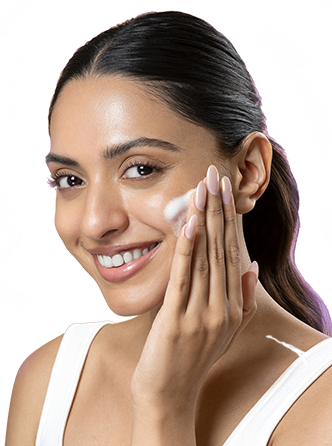
IN THIS ARTICLE
Does your skin sometimes feel unnaturally tight, dull, or oily? That could be your skin’s way of letting you know it’s thirsty. Unlike dry skin, which lacks oil, dehydrated skin lacks water.
—and so even oily skin can be dehydrated!
Thankfully, rather than a skin concern, dehydrated skin is a temporary condition that can be easily fixed with the right skincare products and habits.
Let’s understand what is dehydrated skin in detail, its causes, and ways to treat and prevent it for a plump, healthy glow.
What is dehydrated skin?
Let’s get the basics right. Rather than a skin type, dehydrated skin is a temporary skin condition caused by a lack of water in the uppermost layer of your skin, leading to moisture loss and the appearance of dullness, flakiness, and fine lines.
Difference between dry skin and dehydrated skin
Dehydrated skin is not the same as dry skin. Dry skin refers to a skin type that has lower natural oils and can be visibly dry, and tight. Sure, it is more susceptible to dehydration, but people with dry skin are born with it and it is a type rather than a condition.
On the other hand, any skin type can get dehydrated. When there is an acute water shortage in its cells, it gets dehydrated. Without adequate water, the uppermost layer of your skin lacks moisture, getting irritated and visibly flaky.
Can oily skin get dehydrated?
Yes, oily skin can be dehydrated too. If there is a lack of water and moisture in your skin cells, oily skin tends to compensate by overproducing sebum, making your skin extra greasy and shiny.
Additionally, oily skin can be dehydrated due to harsh skincare products, environmental factors, dry air, etc.
What are the signs of dehydrated skin?
If you come across the following symptoms, your skin could be dehydrated:
-
Acute dryness after washing your face, even if you have oily skin.
-
Dull or tired skin
-
Increased skin sensitivity and itchiness.
-
Fine lines and dark circles, especially around the eyes.
-
Flaky patches on your face and skin.
-
Makeup doesn’t sit right and leaves a cakey or patchy finish.
What causes dehydrated skin?
The following could be the causes of dehydrated skin-
1. Extreme Weather conditions
Harsh winters, hot summers, and exposure to blasting AC for longer durations deplete moisture from your skin and can contribute to dehydration.
2. Inconsistent skincare
Skipping essential skincare steps like moisturization can affect hydration levels and make your skin more susceptible to dehydration and dullness. If you dislike moisturizers because they make you sweat or itchy, you might be choosing the wrong formulation. For oily, combination, or acne-prone skin, it is best to go for gel-based creams. For dry skin, cream-based moisturizers are the best.
Know how to pick the moisturizer as per your skin type here.
3. Wrong skincare products
Wrong skincare habits or even the use of unsuitable products on your skin can affect its moisture level. Over-exfoliation, use of alcohol-based toners or makeup, application of the wrong face cream, and skipping moisturizers are a few reasons for dehydrated skin.
4. Caffeine overload and drinking
Your skin is not a great fan of the endless cups of coffee and late-night drinks that you enjoy. Caffeine and alcohol act as diuretics that pull water out of your body and skin cells, leading to water and fluid loss, and causing dehydration.
5. Inadequate water consumption
Lack of water intake can cause dehydration in your body and skin as well.
6. Stress & lack of sleep
Inadequate sleep and stress lead to a weakened skin barrier, leading to water loss and dehydration.
How to treat dehydrated skin?
While drinking adequate water can solve dehydration, hydration-focused skincare can also support the water levels in your skin.
Here is a simple hydrating routine that can help treat and prevent dehydration in the skin.
Step 1: Gentle cleanse:
Opt for mild and hydrating cleansers with humectants to maintain your skin’s moisture while thoroughly cleansing it. Based on your skin type, you can opt for a cream or gel-based cleanser. Do not rub or scrub your face harshly. Instead, massage the cleanser gently on your face and rinse with lukewarm water.
Step 2: Toning:
Using a toner with hydrating ingredients like rose water, hyaluronic acid, etc., will help balance the pH level of your skin, minimize pores, and give you an added boost of hydration. Spritz it on your skin after cleansing.
Step 3: Serum/Essence
Add a hydrating serum to your skincare routine after toner. A serum with niacinamide or hyaluronic acid will help reduce skin dehydration by maintaining the water levels in your skin. Apply a few drops and gently pat it on your skin. Hyaluronic acid works best when applied on damp skin. It draws moisture from the environment when used on damp skin, leaving it nourished.
Moreover, you can also add face essences to your routine. Face essence helps add a long-lasting hydration layer to your skin, reducing any dryness or flakiness.
Step 4: Moisturization
If you have dehydrated skin, choose a nourishing moisturizer that is infused with occlusives, humectants and emollients, to lock in moisture into your skin for long hours.
If you have oily or sensitive skin choose a light-weight, water-based, and non-comedogenic moisturizer infused with ingredients like hyaluronic acid, green tea, and niacinamide.
For oily skin, ceramides would work best.
Pro tip: Use your hyaluronic moisturizer on damp skin to help it absorb better while sealing in hydration and retaining the moisturizer’s benefits for longer.
Step 5: Sunscreen
Since the sun intensely dries out the skin, choose a sunscreen with an SPF of 30 and above and reapply throughout the day, even if you are indoors.
If you have dehydrated skin, opt for an SPF infused with hyaluronic acid or niacinamide to boost hydration. For sensitive skin, opt for a mineral sunscreen infused with ceramides to both protect and strengthen your skin barrier. For acne-prone oily and dehydrated skin, choose anti-inflammatories like green tea that regulate oil and soothe your skin.
Best products & ingredients for dehydrated skin
Key ingredients to look for your next hydration journey are:
1. Hyaluronic acid
The ability of hyaluronic acid to hold 1000 its weight in water is what makes it one of the best ingredients for hydration. It keeps your skin cells hydrated for long hours and thus manages dryness effectively.
2. Ceramides
Ceramides strengthen the skin barrier, leading to better moisture retention in the skin cells.
3. Glycerin
The topical application of this ingredient attracts moisture from the environment to your skin, ousting dry and rough patches.
4. Squalane
It is a natural antioxidant and anti-inflammatory substance that also boosts hydration, ensuring long-lasting moisturization and skin repair.
5. Betaine
It provides lightweight, non-greasy hydration by pulling water into your skin.
Effective tips to care for dehydrated skin
-
Drink plenty of water - Drink at least 2-3 liters of water every day to prevent dehydration.
-
Get adequate sleep - Make sure you get at least 6- 8 hours of sound sleep each day.
-
Stick to a skincare routine - Identify your skin type, choose suitable ingredients, and follow a dedicated skincare routine consistently to nourish, strengthen, and protect your skin.
-
Use a hydrating face mask every week - Sheet masks are specially formulated to provide deep and instant hydration to your skin, If you’re struggling with severely dehydrated skin, incorporate a hydrating face or sheet mask twice a week in your skincare to provide additional hydration. Don't forget to moisturize after to lock in all the benefits of the treatment.
So now that you know all about dehydrated skin, it’s time to fix the issue! Thankfully, healthy and hydrated skin is just a little effort and a few steps of skincare away!
FAQs:
How to treat dehydrated skin?
The right way to treat dehydrated skin is by following a consistent skincare routine that includes a rich, hydrating moisturizer and maintaining an adequate level of water intake in your body.
What does dehydrated skin look like?
Dehydrated skin lacks luster, has fine lines and flaky patches, and can feel itchy.
Does dehydration cause itchy skin?
Yes, dehydration can increase skin sensitivity leading to flaky and itchy skin
How do I know my skin is dehydrated?
If your skin is dull, patchy, and has flaky patches, you could have dehydrated skin.
How to get rid of dehydrated skin on your face?
By following consistent skincare infused with hydrating active ingredients like hyaluronic acid and ceramides, followed by adequate water intake and sleep,you can treat skin dehydration.














